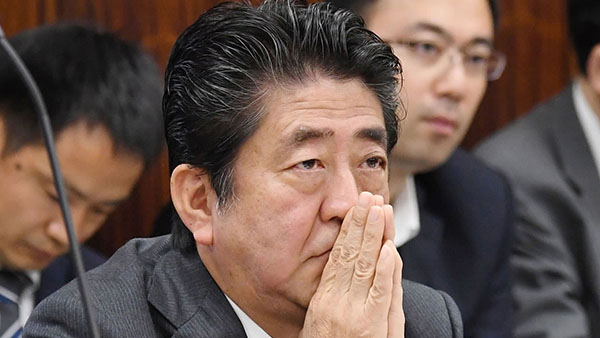


Japanese Prime Minister Shinzo Abe sent a monetary offering to the notorious war-linked Yasukuni Shrine Tuesday on the 72nd anniversary of Japan's surrender which brought an end to World War II.
The Japanese leader sent his special advisor, Masahiko Shibayama, to make the monetary donation by proxy to the shrine.
The donation was made in Abe's capacity as the leader of the ruling Liberal Democratic Party (LDP).
After making the donation as Abe's proxy, Shibayama told a press briefing that Abe had instructed him to pay a visit on his behalf and said that he "feels sorry for not being able to visit the shrine."
It is the fifth consecutive year that Abe has made a ritual offering to the notorious shrine.
Visits and ritual offerings made by senior politicians to the war-linked shrine consistently disregard the feelings of those in Japan's neighboring countries.
As such, the move will likely draw the ire of Japan's closest neighbors, including South Korea and China, who suffered immeasurably at the barbaric hands of the Imperial Army of Japan before, during and after World War II.
Yasukuni Shrine honors 14 Class-A convicted war criminals among 2.5 million Japanese war dead from World War II and is regarded as a symbol of past Japanese militarism.
The shrine is run by a private foundation and the 14 Class-A war criminals' "souls" were enshrined there secretly in 1978, by the clandestine organization.
The foundation, which also runs Yasukuni's museum, nowadays openly depicts the war criminals as martyrs and blatantly misrepresents Japan's war in China as an act of "suppression" rather than one of aggression.
The museum has numerous displays depicting Japan's war-time endeavors, but has flagrantly misrepresented the actual facts, in not referring to the well-documented Nanjing massacre (also known as the Rape of Nanjing), experiments conducted on prisoners of war and the suffering of thousands of "comfort women" at the hands of the Imperial Japanese Army.
 Fire brigade in Shanghai holds group wedding
Fire brigade in Shanghai holds group wedding Tourists enjoy ice sculptures in Datan Town, north China
Tourists enjoy ice sculptures in Datan Town, north China Sunset scenery of Dayan Pagoda in Xi'an
Sunset scenery of Dayan Pagoda in Xi'an Tourists have fun at scenic spot in Nanlong Town, NW China
Tourists have fun at scenic spot in Nanlong Town, NW China Harbin attracts tourists by making best use of ice in winter
Harbin attracts tourists by making best use of ice in winter In pics: FIS Alpine Ski Women's World Cup Slalom
In pics: FIS Alpine Ski Women's World Cup Slalom Black-necked cranes rest at reservoir in Lhunzhub County, Lhasa
Black-necked cranes rest at reservoir in Lhunzhub County, Lhasa China's FAST telescope will be available to foreign scientists in April
China's FAST telescope will be available to foreign scientists in April "She power" plays indispensable role in poverty alleviation
"She power" plays indispensable role in poverty alleviation Top 10 world news events of People's Daily in 2020
Top 10 world news events of People's Daily in 2020 Top 10 China news events of People's Daily in 2020
Top 10 China news events of People's Daily in 2020 Top 10 media buzzwords of 2020
Top 10 media buzzwords of 2020 Year-ender:10 major tourism stories of 2020
Year-ender:10 major tourism stories of 2020 No interference in Venezuelan issues
No interference in Venezuelan issues
 Biz prepares for trade spat
Biz prepares for trade spat
 Broadcasting Continent
Broadcasting Continent Australia wins Chinese CEOs as US loses
Australia wins Chinese CEOs as US loses